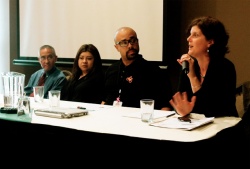
Olivia Quiroz, Mychal Tetteh, Noelle Dobson.
(Photos: BikePortland/Patrick Croasdaile)
In recent years, the fields of public health, equity and transportation policy have become increasingly linked. At a breakout session at the Active Transportation Summit yesterday, advocates and experts came together to learn more about why these issues are linked and discuss how to make that link stronger.
According to Dr. Phil Wu, a pediatric obesity specialist at Kaiser Permanente, “There’s no way to deal with obesity unless we start dealing with issues of transportation.”
“We’ve found that barriers to cycling are culturally specific, and we in turn have had to tailor custom solutions to encourage these populations to bike.”
— Mychal Tetteh, Community Cycling Center
Dr. Wu was one of four members of the panel. He joined Mychal Tetteh from the Community Cycling Center; Noelle Dobson of the Oregon Public Health Institute, and Olivia Quiroz with the Multnomah County Health Department. The panel was moderated by Mara Gross from the Coalition for a Livable Future.
Here’s the problem as Dr. Wu sees it: Health disparities are based in demographics where physical inactivity greatly contributes to obesity, and in these same communities, a lack of traffic safety and poor transportation infrastructure reinforce barriers to walking and cycling (he was principally referring to low-income communities in urban environments).
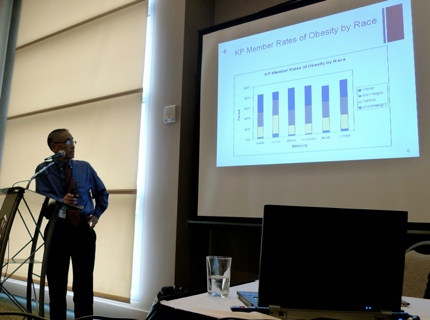
“The majority of time our health care professionals spend treating any disease often has to do with obesity, every part of the body is touched when an individual is overweight.”
Since transportation is a daily activity for most people, Dr. Wu believes we need strong policies that make it easier to connect activity to mobility and to overcome barriers to walking and biking that exist in some communities.
Olivia Quiroz, who heads the Communities by Design initiative for the Multnomah County Health Department, believes that without aggressive efforts to prevent chronic obesity, health care costs will continue to spiral upward. “We need to invest resources in communities that experience health inequities, and we need to tailor specific policies for these communities.”
And what better way to do this than by developing policies for communities in need with their input and involvement guiding the process?
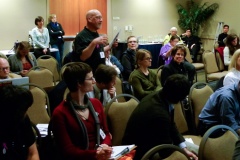
these issues is growing.
Enter panelist Mychal Tetteh of the Community Cycling Center. Tetteh described at length how the CCC brings transportation solutions directly to the communities they serve. Empowerment is key to the CCC’s mission and Tetteh said their goal is to, “find those champions from within communities and give them the tools they need to affect change.”
“There’s no better way to encourage bicycling than in areas where the people are.”
With budgets bleak in Oregon, the big question is how to put more funding resources into the grassroots work by organizations like the CCC. Put a different way, can health and equity issues help bump up the priority for active transportation funding? Or vice versa?
Public health advocate Noelle Dobson believes that given the relatively small amount of money active transportation advocates are fighting for, “We need to use health as a lens to rank one project above another.”
All four of the panelists are confident that community engagement at a grassroots level coupled with the linking of transportation and health equity will result in significant policy change… eventually. Now the matter remains how impending budget cuts at the state (and federal) level will impact their efforts.
I’m tagging along with Tetteh and other CCC staffers to lobby legislators today in Salem. Stay tuned for a report on how/if their message resonates with lawmakers.



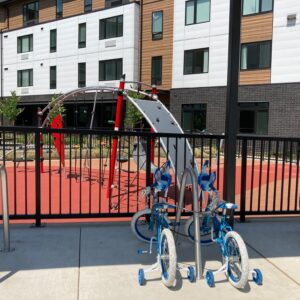
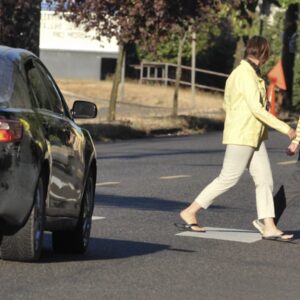
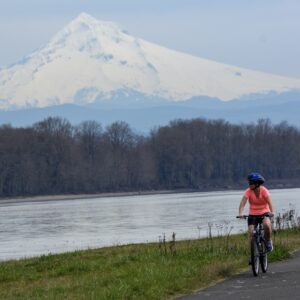

Thanks for reading.
BikePortland has served this community with independent community journalism since 2005. We rely on subscriptions from readers like you to survive. Your financial support is vital in keeping this valuable resource alive and well.
Please subscribe today to strengthen and expand our work.
Go Michelle O! Her http://www.letsmove.gov campaign seems to have all the right parts. What it needs–what we need–and what the panelists mentioned above are advocating for, is an integrated whole public policy that sees public health costs as directly related to transportation policies.
“With budgets bleak in Oregon, the big question is how to put more funding resources into the grassroots work by organizations like the CCC.”
Maybe we need to take some–or better yet all–of the money budgeted for the CRC and put it toward these sorts of efforts. Just imagine how far $3 or $4 billion would go is spent on this sort of thing. Ha.
This info is at the heart of understanding how transportation policy isn’t just about moving vehicles around. The real point is how roads, etc., serve people and communities. “Level of Service” needs to be defined as how a policy or project serves the health of a community.
@ Andrew H – I agree completely. The City of Denver and their Strategic Transportation Plan ( STP) is about “moving people.” I had posted this link in regards to a different story (re: Ms Stewart from Vancouver and her remarks about “bikes don’t pay for road improvements.”). Link below:
http://denvergov.org/AboutDenversSTP/WhatistheStrategicTransportationPlanSTP/tabid/435861/Default.aspx
Denver does not want to build more roads or wider roads, but wants to move people effectively and efficiently. This includes bikes, cars, buses, pedestrians, skateboarders, and people using wheelchairs. I wish Portland ( & Metro area) would follow Denver’s lead.
I’ve heard Dr Wu, and his colleague Jean Rystrom speak before. They are so very correct in that the walk and bike ability of a neighborhood and community has a huge effect on public health.
Great story!
Heh – I agree with the underlying statement – move people, not necessarily cars, but I would happily get into a one-on-one active transportation cage match to the death with Denver. I think Portland can take you 🙂
I applaud this kind of thinking, especially the grassroots, gotta come from within the community approach. I’m thinking especially of the Lents neighborhood, which is generally low income and lacks many of the cycling/transportation resources the inner east side has. That’s changing, but there’s been blowback from some vocal rersidents – the brouhaha over the Holgate bike lane/redesign being one example. If the community had been more involved, including a discussion of the health benefits to local residents, maybe (maybe) some of the anger could have been diffused.
Jonathan. Please change the headline. Remove “race” and replace with culture, background, ethnicity or something. Check the AP style guide for Journalism as it will explain. Using the word race implies that some people are not human. We are all the human race. I know it was an accident. “race” should only be used in forms like “racism” or “racist” as in someone who thinks there are difference races on the continents.
Joe,
Thanks for bringing this to my attention. I wasn’t aware that “race” was a problematic word. I’ve thought a bit about this and it still feels OK to me to use it. I’ll check the AP style guide… but that’s just a guide and everyone has their own style.
We have to balance word choice sensitivities with clear and concise communication. In this case, “race” seems to work and I’ve never heard – nor do I feel after re-reading it several times – that “race” connotes “people are not human’.
Thanks, Jonathan. While “race” is a social construct, it’s important for us to recognize that understanding race connects with many socio-economic barriers in our community. We definitely don’t want to bury this or avoid it, we need to be thoughtful and pay respect to the vast inequities that are sadly, often along color lines.
Using your narrow definition of the word, a racist would be someone who hates humans.
You can’t pick and choose which definitions of a word to keep or get rid of, just because you deem they have a negative connotation.
And guess what, in medicine, that term is used all the time and with good reason. Different races often react differnently to different medications, etc. Also have predispositions to different conditions (balcks and sickle cell anemia, for instance).
@Jonathan – agree with your description of the use of “race”. Race is not a problematic word, it’s some people’s hypersensitive interpretation, and completely appropriate for the context of the article.
I looked online for the section the commenter references but couldn’t find it, I think they charge for the book so it isn’t available in its entirety. However in a recent updates to the style guide article I did find many cases of the AP style guide using the word race while explaining the appropriate times and ways to reference someone’s race in a story. It seems like if it is really such an inappropriate word they wouldn’t use it repeatedly in their guide.
“Race” must be ok to use, otherwise why would people write ‘racial profiling’ all the time?